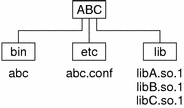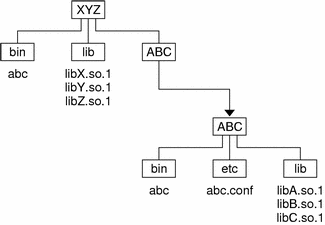Locating Associated Dependencies
Typically, an unbundled product is designed to be installed in a standalone, unique location. This product is composed of binaries, shared object dependencies, and associated configuration files. For example, the unbundled product ABC might have the layout shown in the following figure.
Figure C–1 Unbundled Dependencies

Assume that the product is designed for installation under /opt. Normally you would augment the PATH with /opt/ABC/bin to locate the product's binaries. Each binary locates their dependencies using a hard-coded runpath within the binary. For the application abc, this runpath would be:
% dump -Lv abc [1] NEEDED libA.so.1 [2] RUNPATH /opt/ABC/lib |
and similarly for the dependency libA.so.1 this would be:
% dump -Lv libA.so.1 [1] NEEDED libB.so.1 [2] RUNPATH /opt/ABC/lib |
This dependency representation works until the product is installed in some directory other than the recommended default.
The dynamic token $ORIGIN expands to the directory in which an object originated. This feature depends on an auxiliary vector provided by the kernel to the runtime linker on process startup. See to the getexecname(3C) man page. Using this technology, you can now redefine the unbundled application to locate its dependencies in terms of $ORIGIN:
% dump -Lv abc [1] NEEDED libA.so.1 [2] RUNPATH $ORIGIN/../lib |
and the dependency libA.so.1 can also be defined in terms of $ORIGIN:
% dump -Lv libA.so.1 [1] NEEDED libB.so.1 [2] RUNPATH $ORIGIN |
If this product is now installed under /usr/local/ABC and the user's PATH is augmented with /usr/local/ABC/bin, invocation of the application abc result in a pathname lookup for its dependencies as follows:
% ldd -s abc
.....
find object=libA.so.1; required by abc
search path=$ORIGIN/../lib (RPATH from file abc)
trying path=/usr/local/ABC/lib/libA.so.1
libA.so.1 => /usr/local/ABC/lib/libA.so.1
find object=libB.so.1; required by /usr/local/ABC/lib/libA.so.1
search path=$ORIGIN (RPATH from file /usr/local/ABC/lib/libA.so.1)
trying path=/usr/local/ABC/lib/libB.so.1
libB.so.1 => /usr/local/ABC/lib/libB.so.1
|
Dependencies Between Unbundled Products
Another issue related to dependency location is how to establish a model whereby one unbundled product might have dependencies on the shared objects of another unbundled product.
For example, the unbundled product XYZ might have dependencies on the product ABC. This dependency can be established by a host package installation script that generates a symbolic link to the installation point of the ABC product, as shown in the following figure.
Figure C–2 Unbundled Co-Dependencies

The binaries and shared objects of the XYZ product can represent their dependencies on the ABC product using the symbolic link as a stable reference point. For the application xyz, this runpath would be:
% dump -Lv xyz [1] NEEDED libX.so.1 [2] NEEDED libA.so.1 [3] RUNPATH $ORIGIN/../lib:$ORIGIN/../ABC/lib |
and similarly for the dependency libX.so.1 this runpath would be:
% dump -Lv libX.so.1 [1] NEEDED libY.so.1 [2] NEEDED libC.so.1 [3] RUNPATH $ORIGIN:$ORIGIN/../ABC/lib |
If this product is now installed under /usr/local/XYZ, its post-install script would be required to establish a symbolic link of:
% ln -s ../ABC /usr/local/XYZ/ABC |
If the user's PATH is augmented with /usr/local/XYZ/bin, then invocation of the application xyz result in a pathname lookup for its dependencies as follows:
% ldd -s xyz
.....
find object=libX.so.1; required by xyz
search path=$ORIGIN/../lib:$ORIGIN/../ABC/lib (RPATH from file xyz)
trying path=/usr/local/XYZ/lib/libX.so.1
libX.so.1 => /usr/local/XYZ/lib/libX.so.1
find object=libA.so.1; required by xyz
search path=$ORIGIN/../lib:$ORIGIN/../ABC/lib (RPATH from file xyz)
trying path=/usr/local/XYZ/lib/libA.so.1
trying path=/usr/local/ABC/lib/libA.so.1
libA.so.1 => /usr/local/ABC/lib/libA.so.1
find object=libY.so.1; required by /usr/local/XYZ/lib/libX.so.1
search path=$ORIGIN:$ORIGIN/../ABC/lib \
(RPATH from file /usr/local/XYZ/lib/libX.so.1)
trying path=/usr/local/XYZ/lib/libY.so.1
libY.so.1 => /usr/local/XYZ/lib/libY.so.1
find object=libC.so.1; required by /usr/local/XYZ/lib/libX.so.1
search path=$ORIGIN:$ORIGIN/../ABC/lib \
(RPATH from file /usr/local/XYZ/lib/libX.so.1)
trying path=/usr/local/XYZ/lib/libC.so.1
trying path=/usr/local/ABC/lib/libC.so.1
libC.so.1 => /usr/local/ABC/lib/libC.so.1
find object=libB.so.1; required by /usr/local/ABC/lib/libA.so.1
search path=$ORIGIN (RPATH from file /usr/local/ABC/lib/libA.so.1)
trying path=/usr/local/ABC/lib/libB.so.1
libB.so.1 => /usr/local/ABC/lib/libB.so.1
|
Security
In a secure process, the expansion of the $ORIGIN string is allowed only if it expands to a trusted directory. The occurrence of other relative path names poses a security risk.
A path like $ORIGIN/../lib apparently points to a fixed location, fixed by the location of the executable. However, the location is not actually fixed. A writable directory in the same file system could exploit a secure program that uses $ORIGIN.
The following example shows this possible security breach if $ORIGIN was arbitrarily expanded within a secure process.
% cd /worldwritable/dir/in/same/fs % mkdir bin lib % ln $ORIGIN/bin/program bin/program % cp ~/crooked-libc.so.1 lib/libc.so.1 % bin/program ..... using crooked-libc.so.1 |
You can use the utility crle(1) to specify trusted directories that enable secure applications to use $ORIGIN. Administrators who use this technique should ensure that the target directories are suitably protected from malicious intrusion.
- © 2010, Oracle Corporation and/or its affiliates
